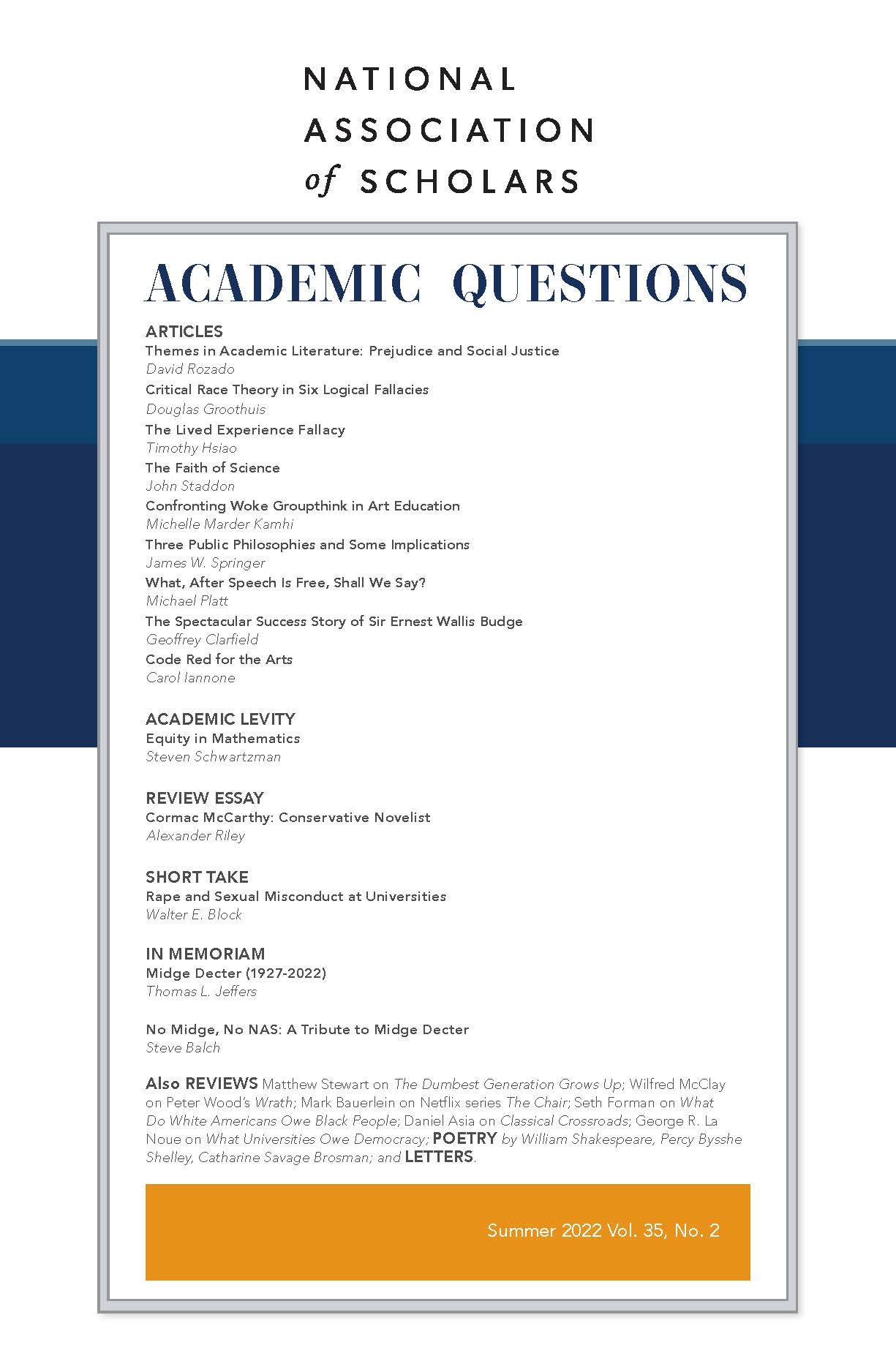What Do White Americans Owe Black People: Racial Justice in the Age of Post-Oppression, Jason D. Hill, Emancipation Books, 2021, pp. 234, $21.49 hardcover.
Seth Forman
In a 2014 article in Salon, DePaul University philosopher Jason D. Hill explained that anyone seeking the truth must relentlessly question the “value constructs outside of those he finds as the dominant ones in his cultural milieu.”1 Hill has lived by this belief, even as it has landed him in hot water. A mixed-race naturalized citizen from Jamaica and self-described “conservative Democrat,” Hill wrote in The Federalist in 2019, “Not all cultures are indeed equal. Some are abysmally inferior and regressive based on their comprehensive philosophy . . . that guide or fail to protect the inalienable rights of their citizens.”2 This observation, made in the admonishment of West Bank Palestinians, triggered DePaul students, who clamored for his head and boycotted his classes. A formal censure from the DePaul University Faculty Council and a rebuke from the university president ensued.3
The dustup has not persuaded Hill to foreswear his belief in the moral superiority of cultures that prioritize individual liberty. His most recent book, What Do White Americans Owe Black People, argues that the Atlantic slave trade must be seen as a rescue of blacks from a clearly inferior animistic culture to a superior one that recognized the basic human dignity of each individual.
By the time Europeans joined the Atlantic slave trade, Hill explains, African blacks were already enslaved, not just literally by dominant tribes, but figuratively by a non-transcendent devotional focus on nature, and “it was, paradoxically, only by being enslaved [in the West], that they crossed the threshold into the historical process” by which man subordinates nature and adapts it to his needs.
This is a difficult argument to make, not only because direct evidence is scarce and it is easily construed as dismissive of slavery’s barbarity, but because there is a strictly enforced sanctions regime awaiting anyone suggesting there are fundamental differences between primitive peoples and the West.4 But it is also true that almost nobody today suggests that blacks in America would be better off if their ancestors had remained in Africa. Muhammad Ali’s quip to a reporter in 1974 after returning from Africa, “Thank God My Granddaddy Got on that Boat,” gave a colloquial voice to Harvard sociologist Orlando Patterson’s finding that the U.S. “offers more opportunities to a greater number of black persons than any other society, including all of those of Africa.”5
Drawing on African thinkers such as Leopold Senghor and Kwasi Wiredu, Hill concludes this is so because the indigenous African man “sentimentalized nature and adapted himself to it like all cyclical creatures who are, therefore, incapable of technological, spiritual, and cognitive evolution on a par with Western man.” (xix)
Enslaved blacks could be forgiven for not recognizing their good fortune, of course. American slavery was cruel, and Hill says it took three American “foundings,” or moral revolutions, before the great advantages of American citizenship would be bestowed upon blacks. Hill isn’t the first scholar to identify the adoption of the Constitution, Lincoln’s Gettysburg Address, and the 1960s civil rights laws as pivotal events in the life of the country, but his interpretation of their meaning and symbolism provides some useful clarity.
The adoption of the U.S. Constitution was the first time in human history that the primacy of man’s rational nature was acknowledged and adapted to the most appropriate political configuration. Despite the Founders compromise with slavery, for the first time the requirements of man’s nature “as a rational and conceptual being, were grafted onto a social and political environment that supported its rational upkeep.” (52)
With the Gettysburg Address, Lincoln not only abolished slavery and asserted equal rights for all Americans, but also ensured that America’s founding principles would no longer remain an abstraction. Coming on the heels of the Civil War’s climactic battle, Lincoln’s address constituted “The Second Founding of America.” (44)
The 1964 Civil Rights Act and other subsequent laws providing legal enfranchisement for blacks made equal rights a reality in people’s lives and constituted a moral claw back for black Americans. Establishing that blacks could no longer be discriminated against even on private property required that whites forego full sovereignty over a fundamental natural right. The “1964 Civil Rights Act constituted a breach of private property” as part of a “grand moral eugenics program that attempted to rehabilitate whites and make them non-racists.” (94)
These events were inflection points in the long but inexorable process of moral repair that blacks required to claim their agency, obviating the need for direct reparations today. Indeed, Hill writes, it is only when America has attempted direct reparations to blacks in the form of the War on Poverty, affirmative action, and academic set-asides that black agency has been thwarted.
Hill argues that the most damaging reparations policy has been the introduction of black studies programs in higher education because it tied black identity to the acceptance of cultural relativism. In a lengthy disquisition on black studies poster child Ibram X. Kendi and others in what he mockingly calls blackademia, Hill writes that they are “part of a cultural Marxist cabal” (176) that “hoodwink[s] a race of people into thinking that all cultures are equal, so that when individuals practicing inferior mores and customs fail because they adhere to them, they are absolved of responsibility.” (177) Because individualism, free markets, and reason are associated with European civilization, black studies’ racial “hustlers” call into question these values “as a social construct meant to erase the identities of marginalized people.” (126, 150)
In one sense, this book is a compelling emotional paean to America’s Founders, whom Hill feels “held a passionate love for man and this earth,” a love expressed blatantly “in the recognition and defense of him as a rational and autonomous, sovereign individual.” (59)
But Hill relies heavily on philosopher Ayn Rand, leading him to fetishize individualism and rational self-interest, to see citizens as isolated and autonomous actors, and to insist that at the heart of the Constitution is the “morally proper conviction that . . . if [man] were to survive anywhere on earth,” he had to exist “as an end in himself.” (66)
Echoing Rand’s formulation of the “heroic” man who must break with his past and make personal happiness his only purpose, Hill makes an implausible call for blacks to reject their racial identity, to see themselves as “heroic race traitors,” and to disown their past.
In his final chapter, “Should the Black Race Die So That the Individual Can Rise? The Heroic Race Traitor and the Road to a New Transracial Future,” Hill implores blacks to “kill the racial ascriptive identity” and in the name of self-respect “return to inviolable and inalienable individualism.” (181) Hill hopes for the ideal of “transracial cosmopolitanism,” which would rid blacks of their biological and historical identity. “To lose one’s ancestry is not a tragedy, but a necessary forgetting of where one came from in order to authentically create oneself anew.” (207)
One can empathize with Hill’s frustration over the prevalence of black racial essentialism and his desire to make black identity a completely voluntary affair. It was the great liberal hope that once race no longer determined destiny, blacks would become a “normal” American ethnic group, retaining their cultural sensibilities and self-help institutions if they chose, but assimilating to an otherwise colorblind civic culture. Black separatism and status as a “protected group” has inhibited assimilation along these lines.
But neither Hill nor others who have tried,6 can explain how race is to be completely disentangled from the rich texture of black American culture, a culture that exists, in novelist Ralph Ellison’s words, “despite the realities of politics, perhaps, but nevertheless [is] here and real.”7
Even those who share Hill’s dismay at America’s collapse into a dystopia of racialized rights and falsified grievances will stare blankly at his visceral assertions that black Heroic Race Traitors “have no ancestors,” they “have no offspring” and that it is impossible to “arrive at the place you are creating unless you forget your history.” (209) One feels compelled to ask if there is no element of the black experience in America, no collective memory, victory, or high honor that can ever serve to nurture human development or larger public affections? Must blacks, perhaps alone among America’s ethnic groups, forget their fathers to forge a path for their sons?
1 Jason D. Hill, “Jamaican, Gay and Ayn Rand Made it OK: My amazing ‘Atlas Shrugged’ love story,” Salon, April 25, 2014.
2 Jason D. Hill, “The Moral Case For Israel Annexing The West Bank—And Beyond,” The Federalist, April 16, 2019.
3 Benjamin Conboy, “Fallout from DePaul professor’s ‘Islamophobic’ article continues,” Depauliaonline.com, April 29, 2019.
4 Geoffrey Clarfield, “Primitive Mentality, Modern Civilization and the Fate of Anthropology:
A Conversation with Professor Christopher Hallpike,” Academic Questions (Fall 2022).
5 Orlando Patterson, “Race, Gender and Liberal Fallacies,” New York Times, October 20, 1991.
6 See Norman Podhoretz, “My Negro Problem, and Ours,” Commentary (February 1963).
7 Ralph Ellison, “The World and the Jug,” in Shadow and Act (Vintage, 1972).
Image: Nicole Baster, Public Domain













